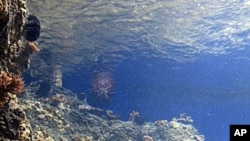A team of international scientists is urging measures to protect the Earth's most vast and uncharted territory: the deep sea. The deep sea and its denizens are already facing threats from human activities such as resource exploitation and global warming. Experts say even more threats lie ahead and they warn that while the deep sea environment may be "out of sight and out of mind," the consequences of its destruction could be far-reaching and irreversible.
The Census of Marine Life was a scientific survey of the flora and fauna in the world's oceans, including five deep-sea ecosystems. Cindy Van Dover, Professor of Biological Oceanography at Duke University, explains the purpose of the Census.
"It was designed to explore what creatures live in the sea, what are they doing there, what were they like in the past, what will they be like in the future," said Van Dover. "It was an effort to bring an international community together to ask questions, where there were synergies that could be developed from working with people from different countries different assets, and begin to build our understanding of what lives in the sea and what will live in the sea."
During the 10-year survey, which ended in 2010, Van Dover and other scientists began to see the threats facing marine biodiversity, especially near the ocean floor. They highlight some of those concerns about the human impact on the deep sea in a newly-published paper. Van Dover is particularly worried about the exploitation of the deep sea's mineral resources.
"There are mining companies that want to extract the minerals on which these animals live," Van Dover added. "So if you were to take away the substratum, you also would take away the animal. How many habitats could you remove? They [the animals] would re-colonize, but there'll be a tipping point where there's not enough brood stock left to populate the site. It's real easy to very quickly exhaust a resource because the reproductive rates aren't fast enough to replenish."
Van Dover says widespread mining of ocean-bottom muds containing valuable rare earth elements, manganese nodules and sulphide deposits is inevitable. But she warns that unless these operations are carefully executed, with restoration programs in place, marine biodiversity will be lost.
Dr. Lisa Levin is a Professor of biological oceanography at the Scripps Institute of Oceanography in California. She worries about how rising temperatures in the atmosphere also bring about change in the ocean. Among the likely scenarios, she says, are stratification, acidification, and changes in nutrient distribution, temperature profiles, and oxygen levels. So how will these changes affect deep sea creatures?
"We don't actually know! The jury is out. People haven't done the studies," said Levin who is worried about species extinction, and notes that extinctions have their own set of consequences. "We almost certainly will see some changes in range distributions and when one species appears or disappears, of course its predators and its prey, also have changing interactions."
Experts say species that are narrowly distributed and do not have high reproductive rates are very sensitive to small disturbances. Unfortunately, this applies to many species in the deep ocean.
But scientists point out that the ocean is not just the most diverse habitat on earth, it is also the evolutionary starting point for all life on Earth. Craig Smith, professor of Oceanography at the University of Hawaii, says that's why the deep sea is so vulnerable and valuable to us today.
"It actually contains a lot of unique evolutionary information and a lot of that information may be valuable in terms of biotechnology," explained Smith. "Extinction is permanent, when you cause reduced biodiversity through extinction, you're changing the course of life of evolution on this planet which is the most unique thing about our planet and to be changing that is a pretty undesirable thing to be doing."
Smith says maintaining the biodiversity and health of the deep ocean is just as important as extracting its commodities. And he hopes policy makers understand that. He and the other scientists involved in the Census of Marine Life program hope that their reports do more than just synthesize their data. They want it to capture the attention of the world's scientists, private citizens, and the myriad industries that value the ocean's resources. The goal, Cindy Van Dover says, is to promote ocean stewardship, restoration, mitigation and conservation.
"I'd like for someone 50 years from now someone to look back at how we've regulated the deep ocean industry and say 'man, these guys got it right when they first started.' And that's a tough thing to do and I don't know if we're going to get it right. But we sure have to try," said Van Dover.





